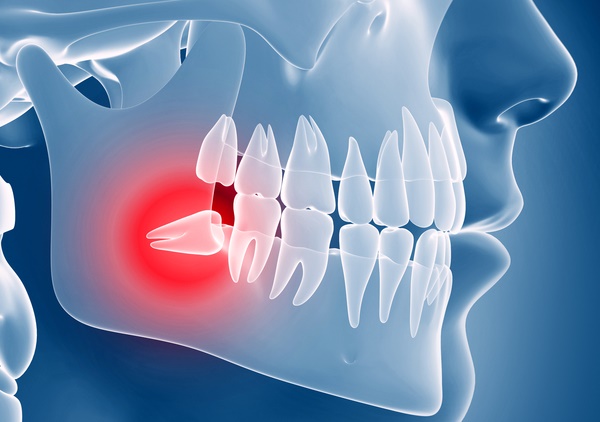Wisdom tooth pain affects many people can include quite mild to severe symptoms. Pain can be felt at the back of the mouth on both the top or the bottom, where the wisdom teeth form. Sometimes, one tooth will cause pain and sometimes multiple teeth will hurt at once.
Wisdom tooth pain can sometimes come out of nowhere, suddenly erupting overnight without warning. On the other hand, wisdom tooth pain can also come on slowly and gradually, and can be shrugged off or perhaps mistaken for something else.
Painful wisdom teeth can occur for a number of reasons. Perhaps your wisdom teeth have come in crooked, can’t fit properly in your mouth, Regardless of the cause, painful wisdom teeth can really impact your overall oral health and should be treated immediately.
Hidden wisdom tooth
When wisdom teeth become impacted the condition is manifested in many unmistakable symptoms, particularly as the condition worsens and the surrounding teeth get affected.
- Throbbing pain in the impacted tooth.
- Radiating pain of the temporomandibular (TMJ) joint, which connects the jaw and skull. This pain may radiate to other areas of the head and face as well.
- The pressure in back molars.
- Swollen, tender and bleeding gums.
- Swollen glands in shoulder and neck.
- Abscess, infection, drainage of gums in gum or tooth.
- Foul breath due to bacterial growth and infection.
- Difficulty and painful chewing.
- Occasional swelling of lymph nodes in the neck.
- Malocclusion – misalignment of corresponding teeth in upper and lower jaws.
Wisdom tooth abscess and infection
The first sign of an infected wisdom tooth is usually pain at the back of your mouth, either in or around the wisdom tooth or in the jaw. If it’s not immediately treated, the pain might spread into the throat and neck as well as all over the jaw. You might also have a sore throat, and the lymph glands just under the jaw may become swollen as the clusters of white blood cells they contain fight the invading bacterial infection.
Your face and jaw may also swell at this time, causing you some alarm and making it difficult to eat, but it’s a sure sign of an infected wisdom tooth. Many people with an infected wisdom tooth also notice a bad taste or smell in their mouth that just won’t go away, and again, this is a result of the bacteria that have taken hold in or around the wisdom tooth and the odours they give off.
cavity in a wisdom tooth can be the cause of infection. Because wisdom teeth are located at the very back of the mouth they are difficult to reach with your toothbrush. Flossing wisdom teeth can be even more difficult. As a result, these teeth are vulnerable to decay.
Wisdom tooth decay
Tooth decay is often caused by having too much sugary food and drink and not cleaning your teeth and gums.
Tooth decay may not cause any symptoms at first.
But if it gets worse it can lead to problems, such as a hole forming in the tooth (dental cavity).
If you have a hole in your wisdom tooth you may have:
- toothache (tooth pain)
- sharp pain in your tooth when eating or drinking hot, cold or sweet things (sensitive teeth)
- white, brown or black spots on your tooth
a damaged wisdom teeth filling
Over time, simple wear and tear will break down a dental filling. Under ideal circumstances, a dental filling should last for at least 10 years.
If a dental filling becomes damaged, the tooth is more vulnerable to decay and infection. To avoid complications such as these, the filling should be replaced as soon as possible.
Here are some of the most common signs that a filling has been compromised:
- Increased wisdom tooth sensitivity, particularly to hot and cold temperatures
- Sudden pain in the treated tooth
- Visible cracks or fissures
- A change in the way that wisdom tooth feels (for instance, feeling a hole or crack when you run your tongue over the tooth)
Broken Wisdom Tooth
As wisdom teeth are the last to come through, there may be limited space in your mouth. As they try to erupt through your gum, another tooth may already be occupying the same spot. Your wisdom tooth may come through at an unnatural angle, or even crack as it forces its way out. In these cases, there may be an increased risk of infection. Gaps allow debris to gather and bacteria to grow, which raises the risk of gum disease and tooth decay.
Pain after wisdom tooth extraction
Typically, during the first 24 hours, you will start to feel something called nociceptive pain. This is acute or slight discomfort caused by tissue or bone damage and is not the same type of pain you might feel if you burned a finger for instance. The good thing about this particular type of nociceptive pain is that it’s superficial – meaning that it decreases through healing.
Normally, any pain felt after a wisdom tooth extraction will peak around 6 hours after the removal process has been completed. You may also see some bruising or swelling starting to appear and traces of blood in your mouth.
Ordinarily, any wisdom teeth removal pain can usually be controlled using over-the-counter-pain medication such as ibuprofen These are usually be prescribed by your dentist and you may be advised to take them two or more times a day to help alleviate any discomfort. In addition, your dentist may also advise applying icepacks at regular intervals to bring out any bruising and swelling at the tooth extraction site.
If the wisdom tooth extraction process was more complex or intensive, your dentist or oral surgeon may prescribe stronger pain medication to help combat the possibility of greater discomfort.
Either way, any wisdom teeth removal pain you may feel after a tooth or teeth extraction should be kept under control using over the counter or stronger medication.
Most people recover from wisdom tooth extraction within 3-4 days and usually by this point, they can go about their normal daily lives. However, for more complex cases or multiple teeth extractions, full recovery may take 7-10 days.


